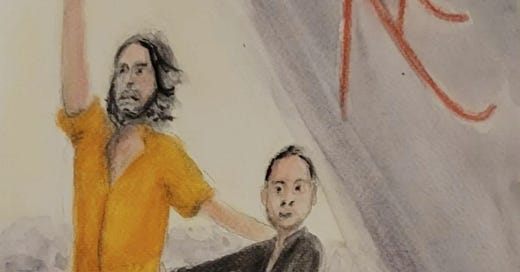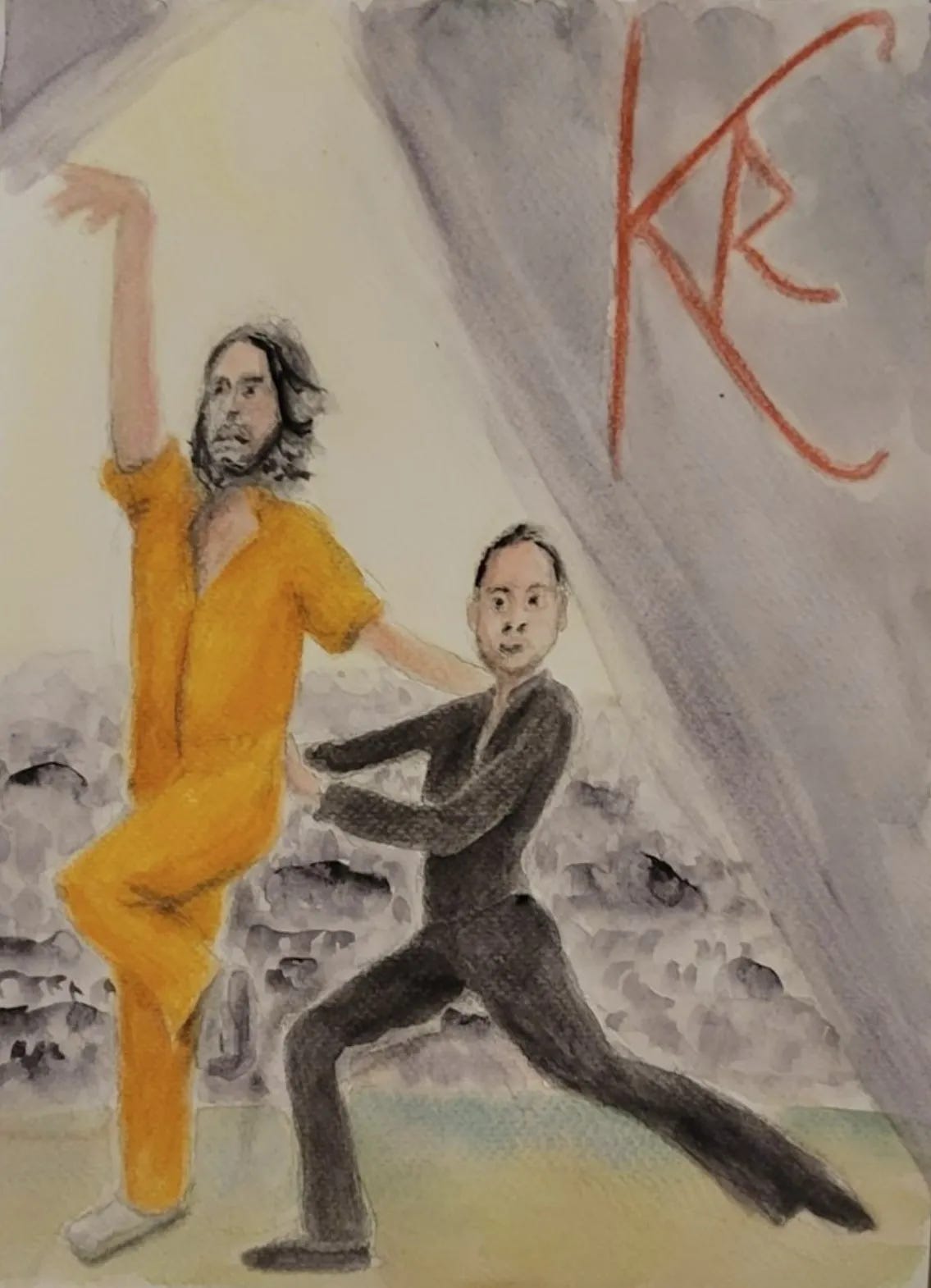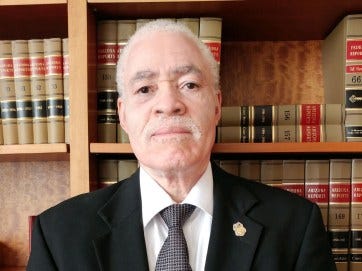Keith Raniere’s ‘Slow Dance’ in Arizona Federal Court
Read Luthmann's Latest on the Frank Report
This article was first published in the Frank Report on March 25, 2023.
Keith Raniere’s ‘Slow Dance’ in Arizona Federal Court
Keith Raniere’s Motion for a Preliminary Injunction in his new prisoner civil rights case is fully submitted to Arizona US District Court Senior Judge Raner C. Collins. Raniere’s lawyer, Tucson-based Stacey Scheff, filed the suit on December 16, 2022, against US Attorney General Merrick Garland, Bureau of Prisons (BOP) Director Colette Peters, the Warden of USP-Tucson (Raniere’s facility), and BOP Official Anthony Gallion.
Judge Collins tossed Raniere’s previous case against these same parties last December based on a procedural defect.
Attorney Scheff filed papers for a Preliminary Injunction on December 19, asking for “Expedited Consideration.” But Raniere’s motion is getting the “slow dance” treatment in Arizona Federal Court because of a series of “procedural gymnastics.” Once these hurdles are all cleared, Judge Collins can issue a Decision on the merits.
Raniere’s Requests
Raniere’s Complaint seeks “narrow injunctive and declaratory relief.” He seeks an order enjoining USP-Tucson prison officials from “retaliating” against him “for constitutionally protected activities.” The Vanguard claims BOP officials are “actively frustrating” and impeding his First and Sixth Amendment rights to access the courts and counsel.
The “urgent” injunction asks Judge Collins to allow reasonable attorney visits and calls and “to prevent retaliatory transfer.”
FR previously reported that on January 13, a supervisory correctional officer informed Raniere that the BOP planned to reassign him to another prison – a Communications Management Unit [CMU]- which would make his communications with the outside world – including his lawyers – almost impossible. The BOP operates two Communications Management Units [CMU] – in Terre Haute, Indiana, and Marion, Illinois. This reporting was publicly confirmed by a BP-11, recently filed as an exhibit.

Raniere wants injunctive relief in four areas:
To receive all legal calls and visits with attorneys that an attorney requests;
To allow Raniere’s power-of-attorney, Suneel Chakravorty, a non-attorney, be recognized as a legal professional to communicate confidentially with Plaintiff;
To be released from SHU and returned to his original unit, or, if Plaintiff has to stay in the SHU, that he be housed in a single cell; and
To be designated to USP-Tucson for the balance of his sentence.
The papers claim USP-Tucson has systematically “banned” all of his supporters – attorney and non – from contact and is thus unable to effectively receive the assistance of counsel or ask the courts for relief. His papers say:
During the two years that Plaintiff has been at USP Tucson, anyone who advocated for his innocence (other than U.S. licensed attorneys) was banned from communicating with him due to claims of being a threat to the safety and security of the institution. However, none of the official responses after the banning of these individuals shows any legitimate penological interests.
Banned persons include Suneel Chakravorty, Nicki Clyne, Dr. Danielle Roberts, and Mexican Attorney Jorge de la Garza. Even Raniere’s current Arizona attorneys, Stoltz and Scheff, “have been banned from in-person legal visits with [Raniere] for the foreseeable future,” according to court papers.
Courts are empowered to enjoin affirmative conduct that offends constitutional rights. Preliminary injunctions are used sparingly by the courts and then usually to maintain the status quo. The only exception is when constitutional rights are threatened.
Raniere is asking for both. He must convince the Court there is irreparable harm, he is likely to succeed on the underlying merits, and that an injunction is appropriate.
Raniere wants to keep the status quo by asking Judge Collins not to let the BOP move him to another facility – ever. If the BOP moves Raniere, the issues will likely become moot because the Vanguard will no longer be in the possession of USP-Tucson. He will effectively be complaining about harms that are no longer occurring and that do not fit into the category where “narrow injunctive and declaratory relief” by the Court will do him any good.
The affirmative conduct Raniere wishes the Court to enjoin relates to his visitor list and access to the outside, particularly to his lawyers. Raniere claims the BOP and USP-Tucson’s exclusion of practically any outside help whatsoever is retaliation in violation of his First Amendment rights:
Here, the adverse actions are: restrictions on Plaintiff’s contacts with his attorneys and power-of-attorney; banning Plaintiff’s friends and supporters; and keeping Plaintiff in the SHU with a mentally unstable cellmate. These are all being done because of protected conduct of speaking out and challenging his criminal convictions. Plaintiff’s First Amendment rights are being chilled by these actions because he is experiencing escalating retaliation each time he exercises his rights, or supporters speak out on his behalf. Plaintiff is literally prevented from speaking to the public via supporters such as Chakravorty and Clyne because they have been banned from all communications with him. These acts of retaliation do not advance any legitimate correctional goal because each justification given has been revealed to be merely the hollow words repeated, “for the safety and security of the institution.”
[Note: Toni Fly was recently moved to USP-Terre Haute and is no longer Raniere’s cellmate in the SHU.]
The papers also claim that by creating onerous restrictions on attorney access and excluding Suneel Chakravorty, the BOP and USP-Tucson violate Vanguard’s Sixth Amendment right to counsel.
Raniere also wants Judge Collins to order him out of the SHU and back into general population or to order him held in a SHU cell by himself.
The Government’s Response
Representing the Defendants, the US Attorney for the District of Arizona filed Opposition to Raniere’s motion. The Government disagrees a preliminary injunction is appropriate. “The Court should deny the application because it fails in all respects to establish the relief requested therein,” the Government’s papers say.
At the outset of the case, filed Government papers claimed Raniere’s lawyers failed to serve the complaint properly – once again.
On January 4, the Court issued an Order confirming all Defendants had to be adequately served, or the case was subject to dismissal. Judge Collins allowed 21 days for each of the Government Defendants to respond to Raniere’s motion for injunctions marked for “Expedited Consideration.”
On February 7, the Government submitted its Response to Raniere’s motion, filing 424-page-long opposition papers. They claim all restrictions imposed on Raniere are justified. At Raniere’s sentencing, Judge Nicholas Garaufis specifically ordered that Raniere “shall not associate in person, through mail, electronic mail or telephone with any individual with an affiliation to Executive Success Programs, Nxivm, DOS or any other Nxivm-affiliated organizations.”
“[Raniere] seeks extraordinary affirmative injunctive relief. Far from the required “clear showing” and heightened standard for such affirmative relief altering the status quo, [Raniere] fails to establish the [required] factors as to any of his requested injunctions,” the Government’s papers say.
The BOP and USP-Tucson claim great discretion in administering their correctional institutions. They argue that how and where they house Raniere and the restrictions placed on his communication are for valid penological purposes, are administrative in nature, and the Court should respect and defer to the DOJ and BOP’s comprehensive policies and procedures.
The BOP has broad powers in managing and regulating all Federal penal and correctional institutions coming directly from Congress. These powers extend to the Designation of Prisoners, SHU Placement, and inmate communications.
The Government takes aim at Suneel Chakravorty, among others, claiming any association with the Vanguard would be inappropriate and counter to “legitimate penological interests”:
As to Mr. Chakravorty, the great weight of the evidence shows that he is Plaintiff’s agent who was affiliated with ESP and NXIVM, not a “paralegal” employed by his attorney, has engaged in conduct that threatened the safety and security of the institutions and the public in both New York and Arizona, and is one of the people with whom Plaintiff was banned by his sentencing judge from associating.
Public policy, the Government claims, also supports their argument. “The evidence establishes no grounds for the extraordinary measure of overriding the professional judgment of the Bureau [of Prisons],” the papers say.
In sum, the Government argues Judge Collins should reject Raniere’s effort to override DOJ and BOP decisions and “choose his place and manner of incarceration.”
Procedural Gymnastics
Attorney Schiff requested a short extension to respond to the Government’s voluminous opposition, which the Court granted. Raniere’s Reply was entered on the Court’s docket on February 24.
On March 3, the Government filed a Motion to Strike Raniere’s Reply because it was more than 11 pages long, in violation of Local Court Rules, and contained information that should have previously been submitted with the original motion:
[Raniere] filed an 18-page Reply and included 241 pages of exhibits and no exhibit list. (Doc. 20.) The majority of the exhibits appear to predate the instant Complaint and Motion. (Id.) Exhibit 1 is a Declaration from Suneel Chakravorty dated February 24, 2023, that addresses his and Plaintiff’s actions in New York before Plaintiff arrived at USP Tucson, and, thus, could have been submitted when the Motion was submitted. (Doc. 20-1 at 2-5.) Exhibit 3 is a Central Office Administrative Remedy Appeal, dated February 17, 2023, the week before the Reply was filed. (Doc. 20-3 at 2.) Exhibit 5 is another Declaration from Suneel Chakravorty dated February 24, 2023, that addresses his and Plaintiff’s actions before June 21, 2022, and, again, could have been submitted when the Motion was submitted. (Doc. 20-5 at 2-6.)
The same day, Attorney Schiff requested the Court grant Raniere leave to exceed the 11-page limit nunc pro tunc (Latin: “now for then”) and deny the Government’s Motion to Strike.
The Government responded, asking the Court to deny Raniere’s untimely motion to exceed page limits “for failure to provide any explanation for his failure to act timely.”
The Court’s Order and Raniere’s Reply
The past Wednesday, March 22, Judge Collins issued an Order granting the Government’s Motion to Strike Raniere’s over-the-page-limit Reply. Citing a California Bankruptcy Court, Judge Collins said:
Federal courts may issue nunc pro tunc orders, or ‘now for then’ orders, to reflect the reality of what has already occurred[.] Such a decree presupposes a decree allowed, or ordered, but not entered, through inadvertence of the court. Put colorfully, nunc pro tunc orders are not some Orwellian vehicle for revisionist history – creating ‘facts’ that never occurred in fact. Put plainly, the court cannot make the record what it is not.
The Court ruled Raniere’s lawyers did not request an extension of pages and gave no explanation why a nunc pro tunc Order is appropriate now. Denying the motion to exceed pages, the Court cautioned Raniere it “will not forage through the exhibits” to speculate how the evidence addresses issues raised in the Government’s response. “Judges are not like pigs, hunting for truffles buried in briefs,” Judge Collins wrote.
A small victory for Raniere, the Court allowed him to file a “conforming 11-page reply, permitting only the inclusion of Suneel Chakravorty’s
affidavit.”
Raniere’s lawyers re-filed the Reply yesterday, on March 23. The new Reply is 11 pages long but does not appear “conforming,” as Judge Collins had ordered.
The new Reply is 68-pages long, including six exhibits and two affidavits from Suneel Chakravorty:
Affidavit of Suneel Chakravorty RE: MDC NY Events + Attachments.
Emails and Documents Showing Chakravorty Paralegal Status.
A Recent Emergency Grievance Regarding Present Danger and Injuries to Plaintiff.
Emails and Documents Showing De La Garza Attorney Status.
Affidavit of Suneel Chakravorty RE: Martial Language.
Recent Affidavits From Plaintiff and Cellmate Toni Fly RE: Conditions and Present Danger to Plaintiff.
Almost sure to draw the ire of the Government and subject to getting “bounced” by the Court, Raniere states the new Reply “raises significantly expanded factual allegations and claims.”
The papers devote significant space to justify that Suneel, Nicki Clyne, Dr. Danielle Roberts, and Attorney Jorge de la Garza should be allowed access to Raniere, rebutting Government claims. Raniere says the BOP and USP-Tucson were aware of Chakravorty’s involvement with NXIVM and his status as Power of Attorney long before he was banned. And even after he was banned, the USP-Tucson Warden approved two legal calls with Chakravorty as a paralegal to Plaintiff’s attorney Joseph Tully.
The Government says Suneel is a problem because statements made on recorded phone calls use terms such as “at war” and “no holds barred.” The papers say, “these are obviously metaphors that are frequently used in the context of legal cases” and “these expressions were harmless.”
The Government also says Chakravorty organized people to dance outside the MDC-Brooklyn prison, characterizing it as “erotic.” Suneel responded to these protestations in one of the attached affidavits:
3. I was the Captain of the Harvard Ballroom Dance Team, so I have a familiarity with dancing.
4. My friends and I began what I would call “a dance movement,” called The Forgotten Ones, to attempt to uplift the spirits of the adults in custody at MDC. Like Mr. Raniere, they had not been permitted in-person visitation in months due to COVID-19 and, because of the COVID-19 lockdown, had to spend most of their days in their cells.
5. As a dancer in college, I have come to view dancing as a form of communication and peaceful expression and not as something intimidating.
6. Our small group publicized and live-streamed our nightly dances on Instagram.
7. Sometimes, family members of adults in custody and other interested individuals joined us in dancing but our numbers were small.
8. Sometimes when family members could not attend in person, they would join on the Instagram live-stream and ask us to wave at their loved one with a flashlight or create a sign for them to see an expression of their love.
9. On one occasion, a Correctional Officer finishing his shift danced with us briefly before driving home.*****
15. The Counter Terrorism Unit (CTU) concluded, “[Raniere’s] manipulative behavior continues to manifest from behind the prison through the help of Suneel Chakravorty. [Raniere’s] actions would place the safety and security of staff and the public at risk.” (Id., p. 12.) Doc. 14 at 5:3-5.
16. It may have been naïve to dance outside a prison and, on one singular occasion, offer coffee and donuts to guards and other members of the staff, and think this would be interpreted in the spirit it was meant. Yet in our intent to make the world a trifle less harsh, we learned something, and perhaps, during the long months of COVID, we provided a bit of hope to the adults in custody – most of whom were pretrial detainees and faced an uncertain future – that when they did return to the world outside the bars of prison that there were those who would still consider them fellow sojourners in the journey we must all travel, the saint and sinner, the prisoner and guard, the judge, prosecutor and jury, and all of us.
As Raniere’s Motion for a Preliminary Injunction is now fully submitted, Judge Collins may issue a Decision at any time. But don’t be surprised if there are more delays and “procedural gymnastics” based upon Raniere’s lawyers submitting five additional exhibits to the Reply above what Judge Collins authorized.
For someone who requested “Expedited Consideration,” Raniere isn’t doing himself any favors by impeding the Court from reaching the actual merits of his claims. While the Vanguard may have asked his Arizona lawyers for a cha-cha, he’s getting little more than a slow dance.
Richard Luthmann is a writer, commentator, satirist, and investigative journalist with degrees from Columbia University and the University of Miami. Once a fixture in New York City and State politics, Luthmann is a recovering attorney who lives in Southwest Florida and a proud member of the National Writers Union.
Drop me a line if you are a victim of the “Swamp” of corrupt politicians, lawyers, judges, or courts. I write about criminal justice, courts, prisons, and reform.
"Nihil est incertius vulgo, nihil obscurius voluntate hominum, nihil fallacius ratione tota comitiorum.” (Nothing is more unpredictable than the mob, nothing more obscure than public opinion, nothing more deceptive than the whole political system.)
~ Marcus Tullius Cicero
For Article Ideas, Tips, or Help: richard.luthmann@protonmail.com or call 239-287-6352.
The news media is a critical check on the powerful, serving as a watchdog to hold elected officials and other public figures accountable for their actions. The media was first called the fourth estate in 1821 by Edmund Burke, who wanted to point out the power of the press. The press plays a crucial role in providing citizens with access to information about what is happening in government, as well as shining a light on corruption, abuse of power, and other forms of wrongdoing.
This is Satire? is a reader-supported publication. To receive new posts and support my work, consider becoming a free or paid subscriber.
Subscribed









